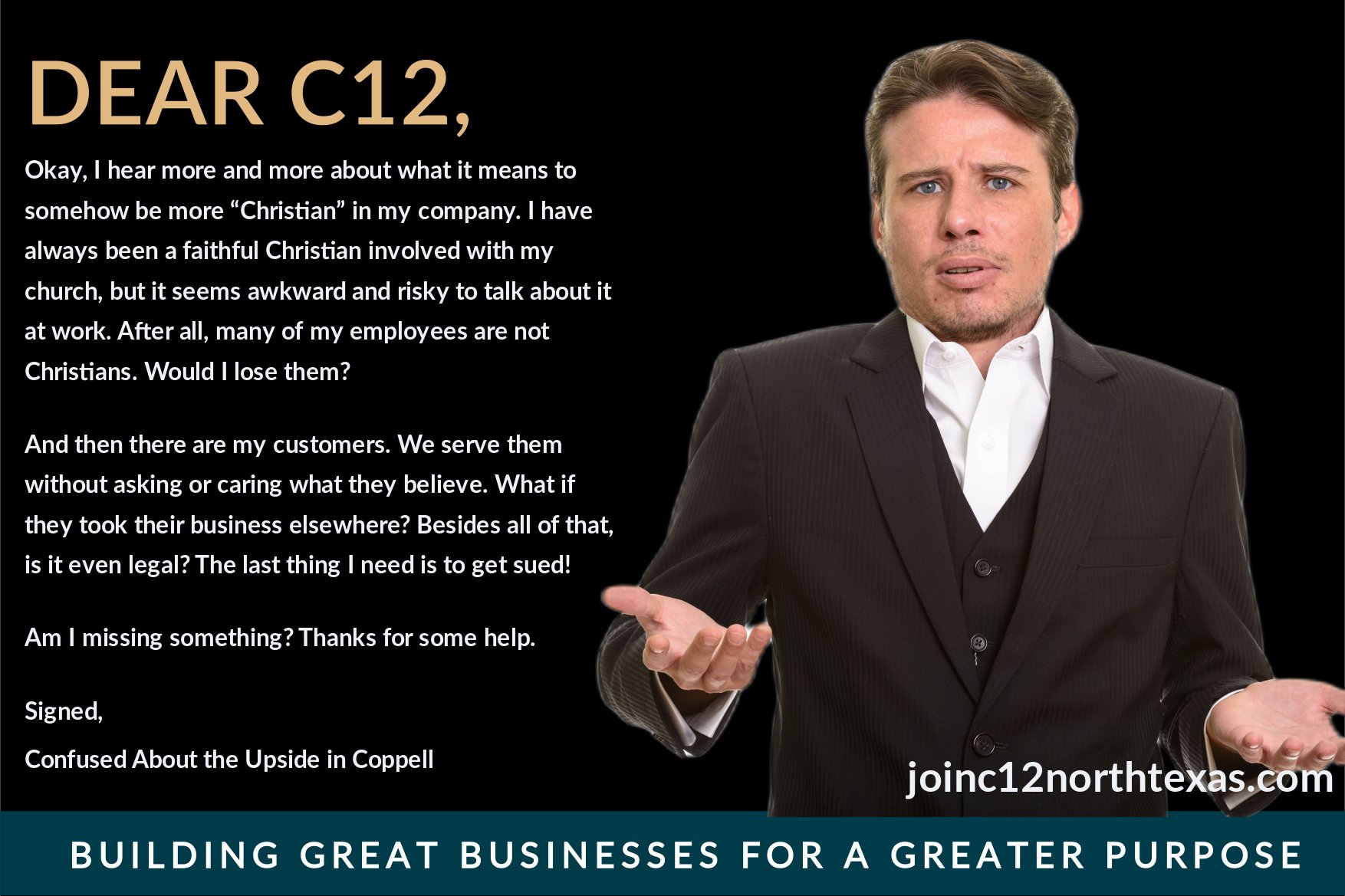
11 May Confused About the Risks
Hi, Tom.
Okay, I hear more and more about what it means to somehow be more “Christian” in my company. I have always been a faithful Christian involved with my church, but it seems awkward and risky to talk about it at work. After all, many of my employees are not Christians. Would I lose them? And then there are my customers. We serve them without asking or caring what they believe. What if they took their business elsewhere?
Besides all of that, is it even legal? The last thing I need is to get sued!
Am I missing something? Thanks for some help.
Signed,
Confused About the Upside in Coppell
Insights for Leaders
Dear Confused in Coppell,
I am very grateful you are wrestling with these questions. Some Christian CEOs never get to where you are. Hence, they are missing an excellent opportunity to impact the people they employ and do business with.
You raise some real concerns. I struggled with the same ones in my career since I thought that my Christian identity had no place in the workplace. I operated with Christian ethics (e.g., honesty, integrity, etc.) without “outing” myself as a Christian. That seemed like a reasonable and safe accommodation. Looking back, though, I realize that the limitations were largely self-imposed. I constructed fears and made assumptions that came with a cost.
Five Principles
Five principles helped me navigate my questions and fears that you might find useful.
1. Everyone Has An Identity, Pick Yours – My default identity was “secular separatist” during the years that I downplayed my faith at work. Most of my peers acted that way, too. I realized that it was a choice for all of us to make. Who were we, and how did we present ourselves to others? Few people object to our sincerely held beliefs and identity. We could have chosen to be obviously “Christian” rather than conform to an unstated norm. If I could do my life over, I would have been bolder to say who I was and what I valued clearly. The Bible says to “confess with your mouth” (Romans 10:9) what you believe. It matters.
2. Don’t Rent Trouble, It’s Extra Effort – Imaginations can run wild, can’t they! I hear in your question fears about what could happen to you. As far as I can tell from your question, none of those fears have come to pass. Would it reassure you that many business owners are successfully living out their faith in the marketplace? And get this, their cultures are thriving, and their customers are happy! Many fears are overblown, especially when we see successful examples. Jesus had a very useful command in Matthew 6:34 where he said, “So don’t worry about tomorrow, for tomorrow will bring its own worries. Today’s trouble is enough for today.” “Renting” trouble means worrying about the trouble that we do not “own.” In other words, we may never have the imagined problems that create our fears. Take a deep breath, and be bold.
3. Mitigate The Risks, Don’t Be Stupid – We have a saying in C12, “being stupid for Jesus is still stupid.” Well-meaning Christians can easily make mistakes that expose them to unnecessary risks. First, remember that your leadership role does not mean you can compel someone to believe as you do. It must be explicit that other faiths (or no faith) are acceptable and will not result in workplace discrimination. Second, the law protects expressions of sincerely held religious beliefs. Learn the rules for doing this well (email for a guide). Third, be sure that participation in faith-based events (e.g., Bible studies, prayer meetings) at your company is voluntary. Fourth, consult an employment attorney to have the correct language in your employee handbook that acknowledges your beliefs and what that means for your employees. Fifth, when in doubt, ask someone that has experience. C12 Forums around the country have owners that are ahead of you in integrating their business with their faith. Or, send me an email.
4. Embrace the Rewards, Note What Lasts – I do not know your specific faith background. Generally, orthodox Christians believe that our time on earth does not compare to an eternity in heaven. All that we accumulate and accomplish in our companies will soon be forgotten. Where are the companies (e.g., Montgomery Wards, Burger Chef, Sears) that my family frequented when I was a child? What does matter to God is people. He cares about them now. And he desires eternal fellowship with them. Okay, the sermon is over, but the message remains. Our real and potential impact on people has great importance. You likely know someone (a friend, mentor, coach) who changed your life. That’s the opportunity for a Christian CEO. It’s worth embracing and growing through our discomfort.
5. Find Some Examples, Just Get Started – The most significant barrier to progress is often inertia. A body at rest tends to remain at rest unless acted on by an external force. The external force for you might be the simple decision to get started with something that reflects your faith at work. Here’s a crazy first thought. Simply tell someone at work that you are a Christian. Ask them for their faith story when you get a “me, too!” answer. Later brainstorm some tangible steps that make sense for your culture. We have an extensive list of possible actions that I would happily share. You will find your boldness (and effectiveness) increasing.
You are on an exciting journey. Be encouraged. Ask more questions. Over time, your confusion will transition to confidence and joy. I know, I have lived that life. I hope that this helps you.
(If you want more information, see the article that C12 CEO, Mike Sharrow, wrote recently.)

Tom Hawes
Principal Chair, C12 North Texas




No Comments